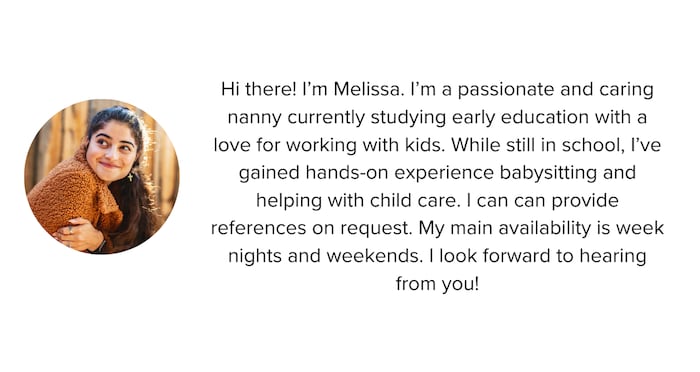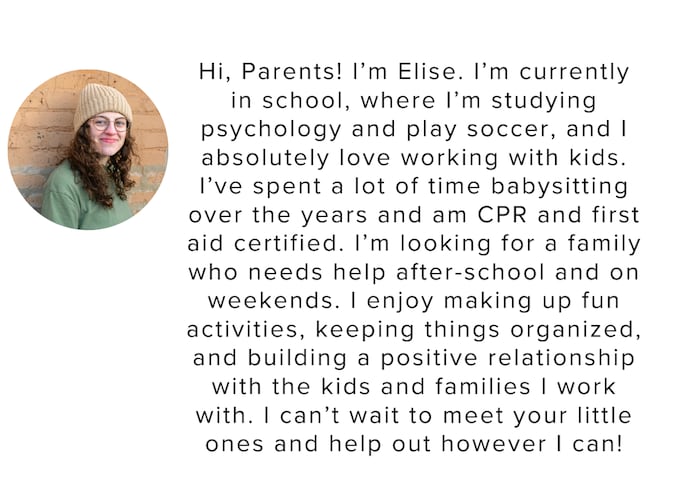In this article
The truth is, having a solid nanny bio can mean having potential families contact you. It is, after all, your very first impression. Unlike resumes, which list out your training, education and experience, a nanny bio is short and sweet — a quick explainer about you and what you have to offer.
“A nanny bio is similar to a cover letter,” explains Reagan Fulton, marketing director at Adventure Nannies. “It’s a family’s first chance to get to know you and a spot where your personality and characteristics can shine through in ways they may not on your resume.”
From what to include (and what to leave off) to nanny bio examples, here’s everything you need to know about crafting a nanny bio that will get you noticed.
What is a nanny bio?
Simply put, a nanny bio is a brief personal and professional introduction that showcases your background, experience and skills, explains Kristen Szapka, founder and owner of A Nanny Match in New York City. “It helps agencies and potential employers get a sense of you beyond your resume while offering a glimpse of your personality and caregiving style.”
You can have a general bio that you post on your website, social media or other online space, or, if applying with a family directly, you can tailor it. (Nanny bios are often found at the top of the resume.)
“At Adventure Nannies, we ask our nannies to write a few sentences specifically for the family we’re introducing them to, so we can be sure the information we’re providing is tailored to each specific family and their unique role,” notes Fulton.
Why you need a great nanny bio
A nanny bio is where you get to show a bit of your personality while listing your best attributes — you can think of it as your hook to your resume. “A compelling bio builds an initial connection and creates a positive first impression,” Szapka says.
Additionally, a solid nanny bio “conveys professionalism and helps a caregiver stand out in a competitive field,” Szapka continues, adding: “Families are not just seeking qualifications; they are looking for someone they can trust with their children and who will integrate seamlessly into their household.”
“A standout nanny bio strikes a balance between showcasing professional qualifications and conveying warmth.”
— Kristen Szapka, founder and owner, A Nanny Match
Nanny bio examples
Here are a few examples of what a great nanny bio may look like:
A skills and experience-focused nanny bio
(Click to download this nanny bio template as a PDF.)
A nanny bio that highlights education and training

(Click to download this nanny bio template as a PDF.)
A nanny bio that captures your job strengths and interests

(Click to download this nanny bio template as a PDF.)
Tips to help your bio stand out
According to Szapka, “a standout nanny bio strikes a balance between showcasing professional qualifications and conveying warmth.” Here’s what she recommends including:
- Relevant experience and certifications.
- Special skills, such as fluency in a foreign language, travel flexibility or a teaching background.
- A brief personal touch — for example, a passion for child development, a love for imaginative play, coordinating playdates, or experience with specific age groups.
It’s also important to use “clear, concise writing in a friendly, professional tone,” she adds. Remember, this is just the precursor to your resume!
“Focus on quality over quantity, ensuring every word contributes to a compelling and informative picture of their qualifications and personality.”
— Reagan Fulton, marketing director, Adventure Nannies
Things to avoid when writing a nanny bio
On the flip side, here’s what you should avoid doing in your bio, according to both Szapka and Fulton:
- Generic statements like “I love kids” without specifics.
- Spelling and grammar errors (proofread carefully!).
- Exaggeration or misrepresentation of experience, which can break trust.
- Oversharing (make it personal, but keep it professional).
- Sensitive topics like politics or religion.
- Overly formal or technical language and industry jargon.
- Relying heavily on AI. “If you’re using AI to help refine your bio, edit it with a discerning eye,” Fulton notes. “Don’t just copy and paste whatever it generates for you.”
How long should a nanny bio be?
Not long. “Your bio should be concise and engaging, ideally between 100-200 words [about 4-5 sentences],” Fulton says. “Focus on quality over quantity, ensuring every word contributes to a compelling and informative picture of their qualifications and personality.”
“A nanny bio should be short and engaging and convey key details without losing the reader’s attention,” adds Fulton. “It’s often placed at the top of a resume.”
The bottom line on nanny bios
Having a solid nanny bio is important, so putting time into crafting yours pays. (And the good news — it won’t take long!)
“A great nanny bio helps families connect with a nanny on a personal level and envision how you might fit into the family dynamic,” Fulton says. “Along with a complete overview of your experience, a well-crafted bio can help you truly shine.”





